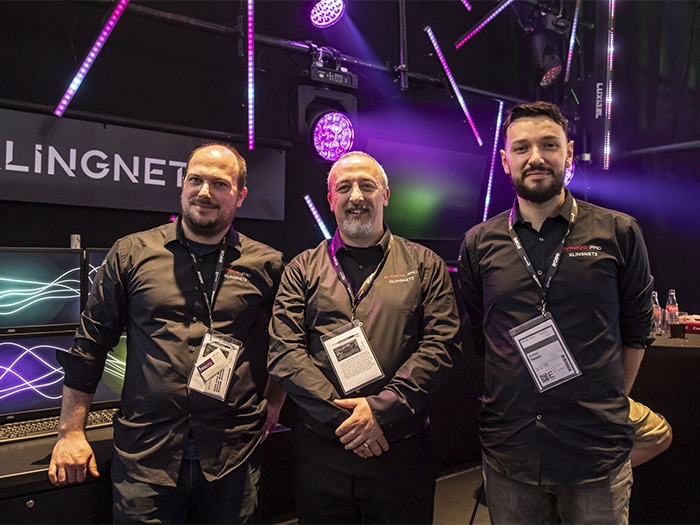KlingNet3 is a new hugely flexible, cloud-compatible, lighting and visual control protocol for the future developed by InMusic Brand’s ArKaos for the entertainment industry. It takes flexibility, user-friendliness, feedback, and ultimate control to next-gen levels.
The whole ArKaos stand at the Prolight+Sound expo, featuring 50 fixtures, was running on a KlingNet3 network via MediaMaster control to demonstrate the stability and robustness of the system.
KlingNet3 (patent pending) enables control of ALL parameters of a lighting fixture – and so much more – and is a viable alternative to DMX.
ArKaos’ KlingNet2 has been a massive success over the last 12 years, developed for pixel-mapping of relevant lighting fixtures and widely implemented by most premium and well-known lighting manufacturers. However, this was limited to controlling only the intensity and colour pixel information of a fixture.
KlingNet 3 unleashed major additional features like the auto-detection of fixtures / fixture types on the network; the facilitation of software updates; remote mode switching and numerous other functions, a long list crunched from the wishes and demands of lighting and visual designers, programmers and end-users combined with extensive research over the last three years.
Based on standard Cloud technologies, KlingNet3 is made to manage more data than even the largest shows currently utilize – it is built for the future.
Manufacturers will have the option of choosing which KlingNet3 protocol features they enable on their new products.
As an important feature, the entire fixture personality is held within the fixture and shared over the protocol with the lighting consoles and media servers.
A full 3D mesh model can be held within the fixture information on the system and made available for visualisers and tracking systems, together with all the relevant colour information, links to the manual and details of all gobo, animation wheel and other effects, allowing the motion and effects of the fixture to be accurately modelled in the visualiser.
A ‘Closed Loop Control Mode’ enables the console to acquire all actual values of the fixture but also allows for the sending of a warning to the console if anything is out of place.
This detailed feedback information can relate to specific parameters and can include elements like voltages, current, lamp power, the hours a light source has been running, RPM of the fans, internal temperature, etc – a host of invaluable information for systems techs – all of which will be communicated via KlingNet3.
ArKaos’s product development manager Koen Buys reported that around 15 key manufacturers had signed up to KlingNet3 ahead of the Prolight+Sound expo last week in Frankfurt, where the product generated enormous interest, so that number is soon expected to increase.
“We had a lot of interest from manufacturers, but what made me happiest is the positive reactions of lighting designers, operators and technicians when we explained the problems we were trying to solve and the solutions we’ve provided,” stated Koen.
KlingNet3 will be available under licence similar to KlingNet2 and has been designed to be ultimately affordable to all.
“The ethos behind the development of this protocol is to move the industry forward and address future needs rather than to make money,” noted Koen.
InMusic’s thinking behind it is to democratise and to make lighting control as straightforward to set up as a smart light / one button touch system. Quick, simple, and reliable, working every time.
When fixtures are connected to the same computer network, they are auto-detected by the system, added to the control console and are immediately available for control.
KlingNet3 facilitates multi-user scenarios for broadcast, complex live shows, festivals, and multi-artist line ups, where there will often be several consoles in operation or in session.
Fixture parameters can be split so selected elements can be controlled – for example – by remote follow spot operators, while others related to the same light can be run from the lighting console.
Designed from the outset to be cloud-compatible, this allows all KlingNet3 features to be bridged via the Cloud, perfect for multi-site control and joy to the ears of installers needing to painlessly implement software updates or pre-emptive maintenance.
It supports live streaming, so local lighting fixtures can be synched to a global system coming from the host stream via the cloud.
The cloud infrastructure also means detailed data can be harvested via KlingNet3 so manufacturers can effectively see how their kit is being used after it is sold. It will record how many times parameters like shuttering, gobos, prisms, etc., are utilised by end users, which can be helpful in fine-tuning future R ‘n’ D plans.
The initial lighting console manufacturers have also already started implementing KlingNet3 and the first fixtures supporting it are expected to hit the market in the coming months.

